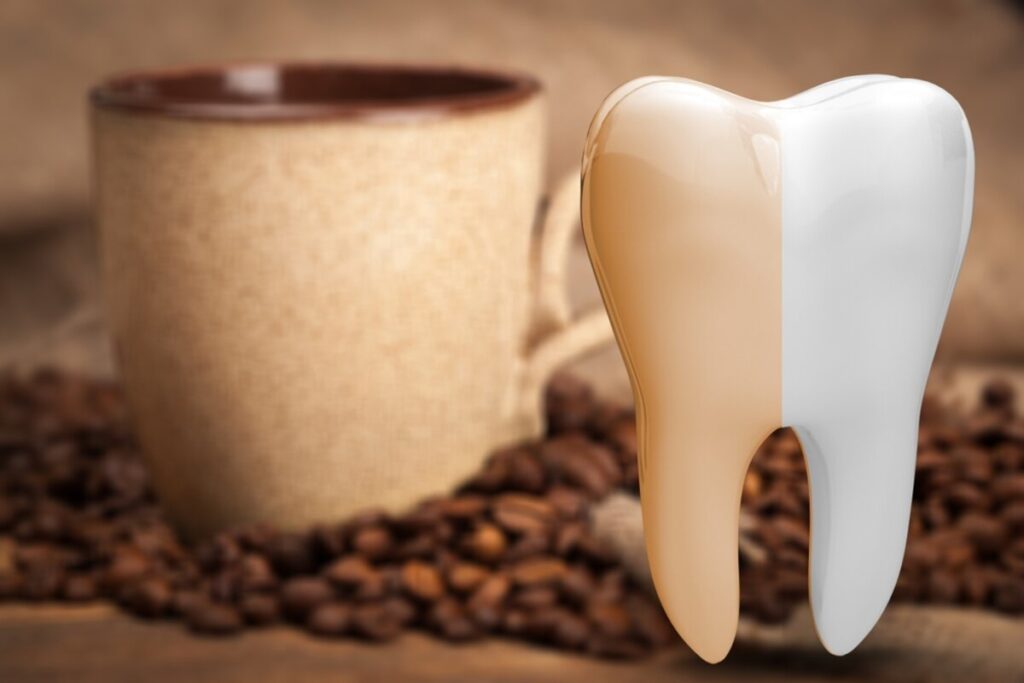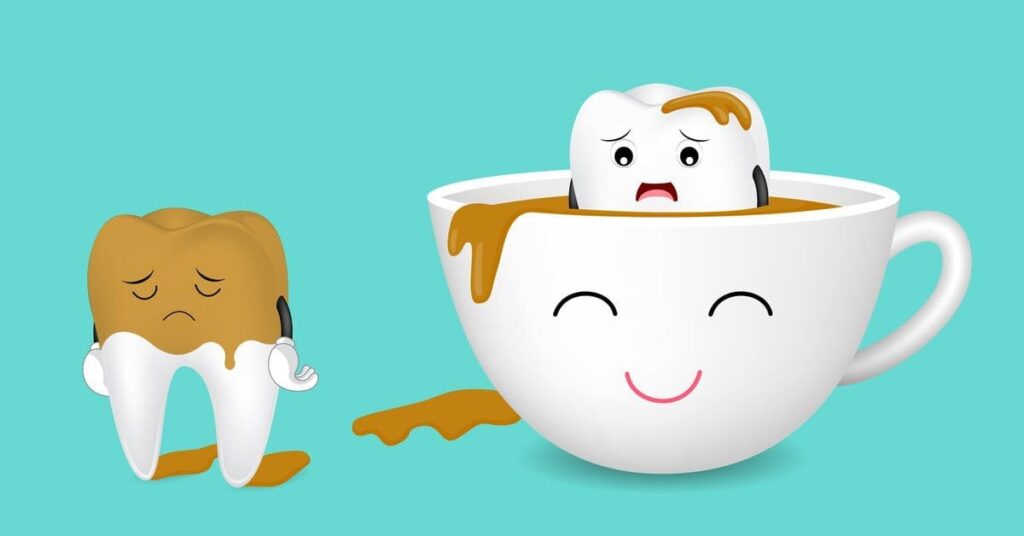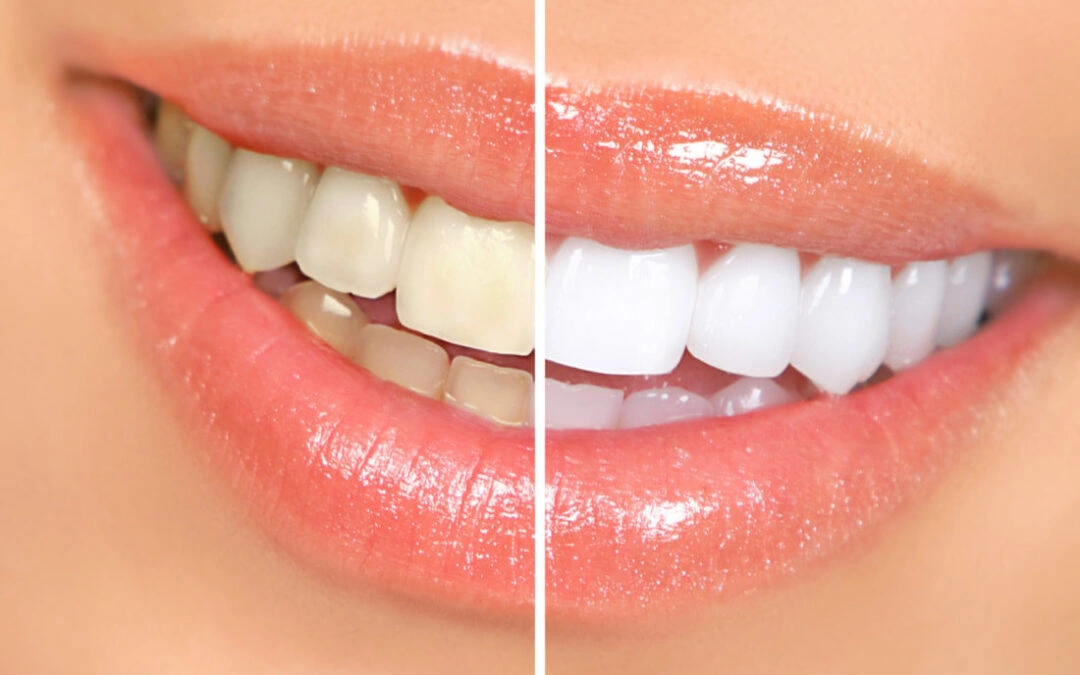For millions around the world, coffee is more than just a drink, it’s a daily ritual, a productivity booster, and a source of comfort. But while your morning cup may perk you up, it might also be dimming your smile. Coffee has long been associated with teeth staining, but its effects go deeper.
This article takes a comprehensive look at how coffee affects your teeth, from staining and erosion to its role in bad breath and gum health. We’ll also share proven, dentist-approved strategies to reduce these effects and keep your oral health in top shape. So, before you take your next sip, read on to learn how to protect your teeth while still enjoying every cup.
1. Coffee and Yellow Teeth: The Science Behind the Stains

Coffee contains tannins, a type of polyphenol that causes color compounds to stick to the teeth. Over time, these compounds create a yellowish tint that’s difficult to remove with regular brushing. The acidity in coffee can also weaken enamel, making it easier for stains to set in. According to the American Dental Association, enamel erosion combined with tannin exposure is a major factor in long-term discoloration.
Did You Know? A 2022 study published in the Journal of Esthetic and Restorative Dentistry found that coffee was among the top three beverages most responsible for surface staining on dental restorations like veneers and crowns.
2. Why Your Teeth Feel Weaker After Coffee: The Erosion Factor

Coffee is naturally acidic, with a pH ranging between 4.85 and 5.10. Prolonged exposure to acidity can gradually erode tooth enamel, the protective outer layer of your teeth. Once the enamel is compromised, teeth become more sensitive, prone to decay, and structurally weaker.
Long-Term Impact:
- Increased tooth sensitivity
- Greater risk of cavities
- Dull or translucent appearance of teeth
If you’re experiencing sensitivity after your daily coffee, it could be a warning sign of early enamel erosion.
3. How to Keep Your Breath Fresh Without Giving Up Coffee

Coffee breath is real and unpleasant. Coffee dries out the mouth by reducing saliva production, allowing odor-causing bacteria to thrive. Add milk and sugar, and you’ve created the perfect breeding ground for bad breath.
Simple Tips to Reduce Coffee Breath:
- Drink water after coffee to rinse away residue
- Chew sugar-free gum to stimulate saliva
- Brush your teeth or rinse with mouthwash 30 minutes after drinking
- Avoid sugary additives that feed bacteria
4. Coffee and Gum Health: Is There a Connection?
Emerging research suggests a possible link between coffee consumption and gum inflammation. While black coffee may have some anti-inflammatory properties, frequent intake, especially when combined with sugar or poor hygiene, can irritate the gums.
Potential Gum Risks:
- Increased plaque buildup due to dry mouth
- Aggravation of existing gum conditions
- Interference with healing in periodontal treatments
Patients with a history of gum disease should be especially cautious with their coffee habits.
5. Can Coffee Affect Dental Implants and Braces?
Yes, coffee can negatively impact both dental implants and orthodontic appliances:
Dental Implants:
- Coffee stains prosthetic crowns, especially if made from porous ceramics
- High acidity may irritate surrounding gum tissue if oral hygiene is poor
Braces (Traditional & Clear Aligners):
- Stains elastic bands and clear aligners
- Sugar in coffee drinks can promote decay around brackets
Expert Insight: According to specialists at Al Safwa Medical Center, patients with implants or braces should rinse thoroughly after coffee and consider drinking through a straw to minimize contact.
6. 7 Dentist-Approved Ways to Protect Your Teeth
- Use a straw to limit contact with front teeth
- Drink water immediately after coffee
- Wait 30 minutes before brushing to protect softened enamel
- Use fluoride toothpaste to strengthen enamel
- Chew sugar-free gum to stimulate saliva
- Visit your dentist regularly for cleaning and checkups
- Consider whitening treatments under professional supervision
Bonus Tip: Choose black coffee without sugar to reduce risks.
7. Early Warning Signs of Coffee Damage
If you notice any of the following, it may be time to reassess your coffee consumption:
- Persistent yellow or brown discoloration
- Increased tooth sensitivity
- Bad breath even after brushing
- Gum tenderness or bleeding
- Cracks or chips in enamel
The earlier you address these signs, the better your chances of avoiding serious dental issues.
Don’t Let Coffee Steal Your Smile
At Al Safwa Medical Center Abu Dhabi, we understand the balance between enjoying life and protecting your health. Our expert dental team offers advanced solutions in:
- Cosmetic Dentistry Abu Dhabi
- Teeth Restoration Abu Dhabi
- General Dentistry Abu Dhabi
- Dental Implants Abu Dhabi
- Orthodontics for Kids and Adults
- Root Canal Treatment Abu Dhabi
Let us help you maintain your beautiful smile while still enjoying your favourite cup.
📞 Call: +971-24448877
🌐 Visit: alsafwamedical.ae
📍 Location: Bani Yas, Abu Dhabi, UAE
Frequently Asked Questions (FAQs)
- Can I drink coffee after teeth whitening?
We recommend to avoid coffee for at least 48 hours after whitening. Use a straw and rinse with water to reduce staining. - How can I prevent coffee from staining my teeth?
Drink through a straw, rinse your mouth with water afterward, and maintain regular dental cleanings. - Can coffee affect my dental implants or braces?
Yes, coffee can stain prosthetics and brackets and may irritate gum tissue around implants if not cleaned properly. - How often should coffee drinkers visit the dentist?
At least twice a year, but more frequent visits may be recommended for heavy coffee drinkers or those with existing dental work. - Is black coffee better for teeth than coffee with milk?
Black coffee contains fewer sugars and additives that harm teeth, making it a slightly better option, but it still causes staining.

